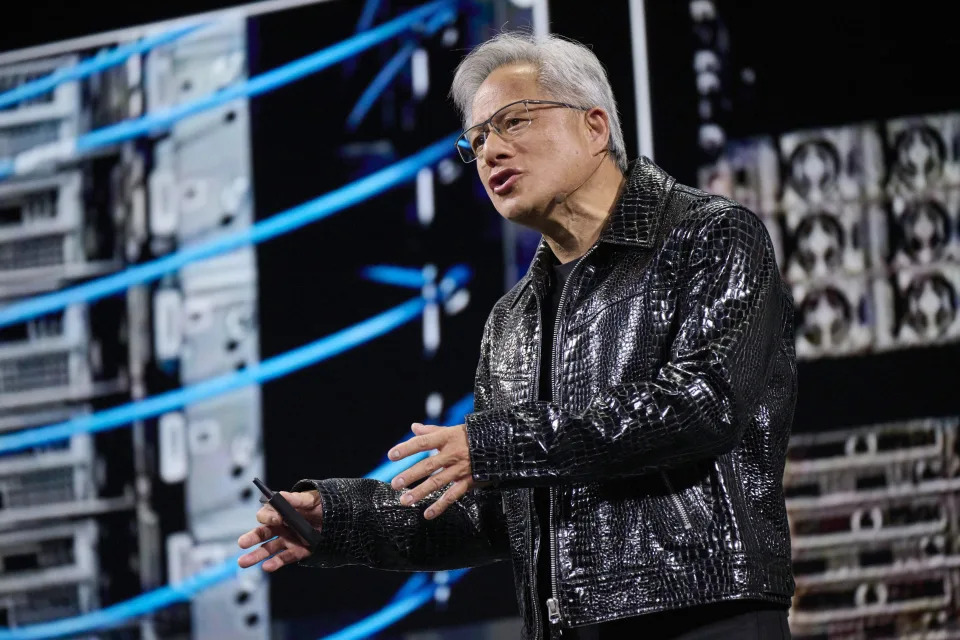DeepSeek sparked a market panic — but some think the sell-off is overblown

Did the market overreact?
That's the question tech investors are asking after they got walloped on Monday when Chinese AI lab DeepSeek shocked markets with a model that runs on fewer, less advanced chips — wiping out $1 trillion in stocks.
Trillions were expected to be spent on AI infrastructure, but DeepSeek's breakthrough challenged that assumption .
Still, some believe the panic was premature, and their reasoning is based on the premise that more efficient AI could accelerate its adoption — in turn, increasing demand for the AI chips made by Nvidia and others.
Is the DeepSeek sell-off overblown?
Hamish Low, an analyst at research firm Enders Analysis, told Business Insider that the reaction to the chip stock sell-off seems "quite overblown" as "being able to use compute much more efficiently," a key claim of DeepSeek's R1 release, "is by no means bad for compute demand."
Several tech leaders, such as Microsoft CEO Satya Nadella, have taken to social media to make a similar point by citing the Jevons Paradox, the idea that as the cost of using a resource falls, demand will go up — not down.
As Nadella put it on X : "Jevons paradox strikes again! As AI gets more efficient and accessible, we will see its use skyrocket, turning it into a commodity we just can't get enough of."
Or, as former Intel CEO Pat Gelsinger put it in an X post on Monday, "Computing obeys the gas law."
He added, "Making it dramatically cheaper will expand the market for it. The markets are getting it wrong, this will make AI much more broadly deployed."
That suggests AI leaders want more efficiency alongside more computing power. In that scenario, AI companies could use compute freed up from more efficient AI models elsewhere, theoretically helping them scale faster at a time when the industry had voiced concerns about a slowdown .
"Everyone in the space is compute constrained," said Ethan Mollick, a Wharton professor who studies AI, in an X post on Monday. "More efficient models mean those with compute will still be able to use it to serve more customers and products at lower prices & power impact."
Similarly, Bernstein analysts wrote in a Monday investor note that their "initial reaction does not include panic." The analysts, also citing the Jevons paradox, said that "any new compute capacity unlocked is far more likely to get absorbed due to usage and demand increase vs impacting long-term spending outlook at this point."
Nvidia, which plummeted nearly 18% in Monday's market rout, said in a statement on Monday that DeepSeek is an "excellent AI advancement." The company added that inference, a technique used by DeepSeek to analyze new information using trained models, "requires significant numbers of Nvidia GPUs and high-performance networking."
Meanwhile, Dan Ives, a Wedbush analyst, used a note to remind investors of the bull case for Nvidia. He wrote that while launching a competitive model for consumers was one thing, Nvidia's "broader AI infrastructure" involving robotics, for instance, "is a whole other ballgame."
AI model developers have also been very clear about their intent to buy more AI hardware in the near future. Last week, both OpenAI and Meta announced massive plans to drastically increase their investment in AI chips and relevant infrastructure.
The ChatGPT maker announced a $500 billion initiative called Stargate to that end, while Meta CEO Mark Zuckerberg said his company was increasing its capital expenditure on AI this year to $65 billion.
Taken together, these initiatives signal a serious willingness from top AI players in Silicon Valley to continue spending on the products sold by the companies on the negative end of the market rout triggered by DeepSeek.
Bearish signals
However, for other industry watchers, there remains a sobering rationale behind Monday's market sell-off.
Javier Correonero, an equity analyst at Morningstar, told BI that investors will be conscious that if DeepSeek's claims hold true, then there is reason to question if Big Tech firms like OpenAI, Meta, and others need to spend billions of dollars on securing extra chips.
"In my view, in the short-medium term, this could be bearish because maybe now the Big Tech firms that are doing all the capex will start focusing more on optimizing all their existing AI infrastructure rather than keep on acquiring more," he said.
Enders Analysis' Low made a similar point, telling BI that "DeepSeek is maybe just acting as a trigger point here for much broader investor unease around the returns on Big Tech AI capex and Nvidia's continued rise."
For others, the DeepSeek sell-off should be seen as more of a correction than a bubble.
"The underlying narrative that drove equity performance in the past two years, that AI will profoundly change the world, is still very much relevant," said George Lagarias, chief economist at Forvis Mazars. "The only thing that has changed is that some of the froth is being removed from valuations and earnings expectations, especially around Nvidia."
In the meantime, investors will continue to reel from the fallout of Monday's market rout while Silicon Valley leaders unpack how DeepSeek achieved so much with seemingly so little.
Read the original article on Business Insider

